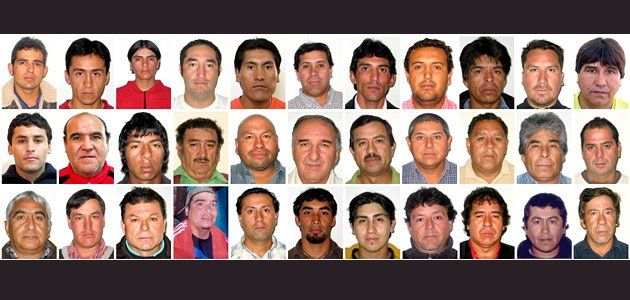
They have been trapped a mile underground for 20 days, their lifeline to the surface a bore hole the diameter of a grapefruit. Thirty-three miners, alive but imprisoned after an earthquake in Chile, have not yet been told it will take three more months to get them out. As NASA experts are consulted about how to keep them healthy and sane, a former official of the agency explains to NEWSWEEK how the men can survive in dark isolation for so long.
The most important thing is that the miners "talk to somebody outside," says Dr. Joan Vernikos, who was director of NASA's life-sciences division for almost a decade. "In a spacecraft or a mine they are helpless; they depend completely on support from the outside world."
Vernikos used to help look after astronauts and cosmonauts isolated in space for months at a time, and specializes in the effects of stress on people in extreme situations. "The type of connection is important too," she says, discussing letters that the miners are exchanging with loved ones. In one such letter, miner Edison Pena told his family, "You have no idea how much my soul ached to have been underground and unable to tell you I was alive," according to Reuters. "The hardest thing is not being able to see you."
Above the collapsed mine, workers are painstakingly digging a two-foot-round tunnel through shifting rubble. Excavation will take three additional months, because rescuers must be careful to avoid further collapse. The men will be hoisted back to the surface one by one by the end of November, if all goes to plan. NASA will provide "expert advice on medical, nutritional, and behavioral-health issues" to help the trapped men, agency spokesperson Joshua Buck confirmed. He said NASA scientists are working with Chilean officials, via the State Department, to keep the miners healthy and sane.
The miners' families are living in plastic tents at the mine, in a camp called Hope. But they will soon return to their normal lives, taking shifts at the mine. That situation can cause heartbreak, Vernikos says. "Those people are going home and the miners can't, and that is the last thing they need to be reminded of," she says. It may seem trivial, "but it can even affect astronauts when shifts change at ground control."
Even efforts at staying in touch might not be enough, says Vernikos. "One Russian cosmonaut told me he stopped communicating with his family after a while because it was just pointless—what are you going to say to anyone on the ground?" She notes that "the families of the miners should just say normal things—'little Johnny got into a scrape at school.' That means more than 'we are thinking of you and you are in our prayers' because there is action, there is life."
The miners will be given antidepressants, according to reports. Chilean Health Minister Jaime Manalich told Reuters that, after the euphoria of being discovered alive, the men "will likely see a period of depression and anguish." The drugs are being sent because "it would be naive to think they can keep their spirits up like this." Vernikos says that, unless the men are attacking each other, it is more important to look after the mental health of loved ones aboveground. "In a way," she says, "the behavior and resilience of those on the surface has more impact."
She also disagrees with officials who plan to tell the miners precisely how long they will remain trapped. "It's not lying to them, it's maintaining hope, telling them you don't know exactly, which is probably true," she says. When people know how long they will be away, as on a nuclear submarine, she says, they "will go to pieces in the middle of the time. They will stop exercising, they will stop shaving, they will not wash."
They begin to take care of themselves only toward the end of their rotations, she explains. "If the miners keep thinking they might get out, they will take better care of themselves," she says, "and that makes it so much easier to recover. If you have some hope, or even if you get angry because you are still trapped, it is better than nothing, than waiting. It is at least being alive."
Vernikos expects that, despite lights underground, without sunshine the miners' biorhythms will collapse and the relation between their bodies' systems— like heart rate and temperature—will become distorted. Any injuries they have will take a long time to heal, and they will be vulnerable to disease, she adds. And she notes that a diet of rations, along with limited exercise—she recommends isometrics and yoga—will not help.
And the men will emerge scarred, Vernikos tells NEWSWEEK. "Being down there is like a loss," she says. "We think of loss as being a person, a loved one. But this is the same, and the reaction will be the same—these men have lost a part of their lives. Research on bereavement says that it takes 18 months to recover mostly, and five years to recover fully."
Families must be told that it will not be easy when their fathers, sons, and brothers emerge at the end of November. "When they come back suddenly, life is not going to pick up where it left off," she warns. "They will be changed. The way they look at the world will be changed. The way they look at other people will be changed. It will get back to another level of normalcy eventually. But it will not be the same."
Uncommon Knowledge
Newsweek is committed to challenging conventional wisdom and finding connections in the search for common ground.
Newsweek is committed to challenging conventional wisdom and finding connections in the search for common ground.
About the writer
To read how Newsweek uses AI as a newsroom tool, Click here.








